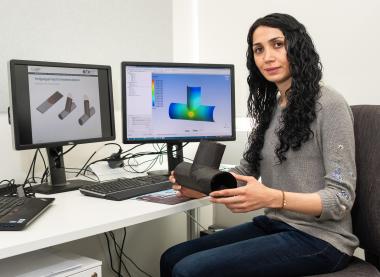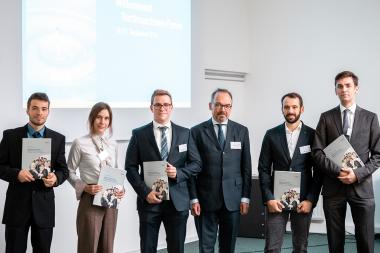Wissenschaftlerin vom ITM der TU Dresden mit dem Innovationspreis des Industrieclubs Sachsen geehrt
Frau Dr.-Ing. Monireh Fazeli¬ Zoghalchali vom Institut für Textilmaschinen und Textile Hochleistungswerkstofftechnik (ITM) der TU Dresden wird am 23. Oktober 2018 für ihre Dissertation "Technologieentwicklung für gewebte Knotenstrukturen mit komplexer Geometrie in Integralbauweise für Faserverbundanwendungen“ mit dem Innovationspreis des Industrieclubs Sachsen 2017 ausgezeichnet. Der Preis ist mit 5.000 Euro dotiert und wird jährlich an einen Absolventen der TU Dresden verliehen.
Die Entscheidung zur Vergabe des Innovationspreises des Industrieclubs Sachsen 2017 erfolgte im Juni 2018 durch ein Preisgericht. Am 23. Oktober findet nun die feierliche Verleihung durch den Industrieclub Sachsen in Dresden statt. Frau Dr. Fazeli absolviert derzeit bis Ende März 2019 im Rahmen des DAAD-Förderprogramms P.R.I.M.E. (Postdoctoral Researchers International Mobility Experience) einen internationalen Forschungsaufenthalt am Centre for Advanced Composite Materials (CACM), University of Auckland in Neuseeland. Deshalb wird Herr Professor Chokri Cherif, Institutsdirektor des ITM und Doktorvater von Frau Dr. Fazeli, den Preis stellvertretend entgegennehmen.
Im Rahmen ihrer Dissertation, die Frau Dr. Fazeli im Dezember 2016 mit der Bestnote „summa cum laude“ abschloss, wurde eine CAE-gestützte Prozesskette zur effizienten automatisierten Fertigung komplexer gewebter Knotenelementhalbzeuge aus Carbonfasern für Rahmentragwerke in Fahrzeugen, Flugzeugen, Maschinen und Anlagen sowie der Architektur realisiert. Für diese Rahmentragwerke in Leichtbauweise steht derzeit bereits ein umfangreiches Sortiment aus faserverstärkten Profilen zur Verfügung. Die erforderlichen Knotenelemente zur Verbindung der Profile sind entweder nach wie vor aus Metall oder müssen extrem aufwändig und somit kostenintensiv gefertigt werden.
Mit der neuen automatisierten Technologie ist es möglich, hochkomplexe, in mehreren Raumrichtungen verzweigte Knotenelemente webtechnisch in einem Stück zu fertigen. Damit entfallen die Prozesse des Zuschnittes und sehr aufwändigen Fügens von Teilflächen. Die Bauteilperformance wird deutlich gesteigert. Am ITM wird in enger Zusammenarbeit mit der Firma MAGEBA International GmbH und durch die finanzielle Förderung von Forschungsprojekten über die AiF im Rahmen des Programms zur Förderung der Industriellen Gemeinschaftsforschung (IGF) vom Bundesministerium für Wirtschaft und Energie (BMWi) die gesamte Prozesskette vom CAD-Entwurf, über die strukturelle Entwicklung, die Erstellung der Maschinensteuerprogramme, die textiltechnische Umsetzung und die Bauteilkonsolidierung erfolgreich erarbeitet.
TU Dresden, Techtextil, Texprocess, ITM Dissertation carbon fibers ITM BMWi Flugzeugbau
Technische Universität Dresden





